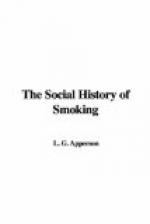Thackeray, as the satirist of the foolish social prejudices against smoking, was naturally an inveterate smoker himself. He died in 1863, and so hardly saw the beginning of a change in the attitude of society towards the pestilent weed; but he was one of the many men of letters and artists, who, despising the conventions of society, were largely instrumental in breaking down stupid restrictions, and in overcoming senseless prejudices, and were thus heralds of freedom. Charles Keene’s attitude was that of many artists. He smoked a little Jacobean clay pipe in his “sky-parlour” overlooking the Strand, and did not care in the least what the world might think or not think about that or any other subject.
Those who smoked pipes at Cambridge continued to smoke pipes afterwards, whatever “society” might do. Spedding, who spent his life on the elucidation of Bacon, was one of the “Apostles,” and he continued a pipe-lover to the end. In 1832 we hear of Tennyson being in London with him, and “smoking all the day.”
Lady Ritchie, in “Tennyson and his Friends,” says: “I can remember vaguely, on one occasion through a cloud of smoke, looking across a darkening room at the noble, grave head of the Poet Laureate. He was sitting with my Father in the twilight after some family meal in the old house in Kensington.” Thackeray was a cigar-smoker, but Tennyson was a devotee of the pipe. It was on this occasion, as the poet himself reminded Thackeray’s daughter, that while the novelist was speaking, Lady Ritchie’s little sister “looked up suddenly from the book over which she had been absorbed, saying in her sweet childish voice, ’Papa, why do you not write books like ‘Nicholas Nickleby’?’”
Tennyson wrote “In Memoriam” at Shawell Rectory, near Lutterworth, Leicestershire. The rector was a Mr. Elmhirst, a native of the poet’s Lincolnshire village. The latest historian of Lutterworth says that “The great puffs of tobacco smoke with which he [Tennyson] mellowed his thoughts, proved insufferable to his host, and he was accordingly turned out into Mr. Elmhirst’s workshop in the garden, which in consequence became the birthplace of one of the gems of English literature.”
About 1842, when Tennyson often dined at the Old Cock (by Temple Bar) and at other taverns, the perfect dinner for his taste, says his son, was “a beef-steak, a potato, a cut of cheese, a pint of port, and afterwards a pipe (never a cigar).” When the Kingsleys paid the Tennysons a visit about 1859, Charles Kingsley, so the Laureate told his son, “talked as usual on all sorts of topics, and walked hard up and down the study for hours smoking furiously, and affirming that tobacco was the only thing that kept his nerves quiet.” The late Laureate, Alfred Austin, once asked Tennyson, after reading a passage in Dorothy Wordsworth’s “Journal” that William had gone to bed “very tired” with writing the “Prelude,” if he had ever felt tired by writing poetry. “I think not,” said the poet, “but tired with the accompaniment of too much smoking.”




